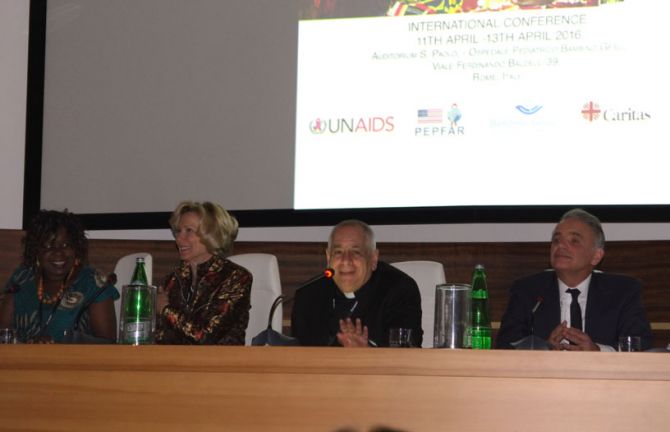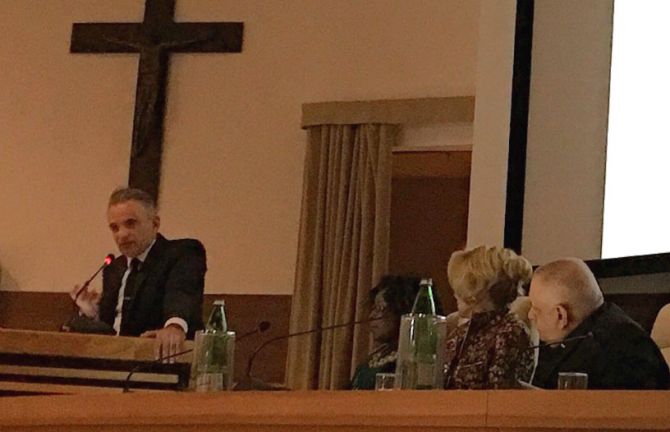


Update
Vatican meetings urge accelerated access to HIV testing and treatment for children
19 April 2016
19 April 2016 19 April 2016Caritas Internationalis recently brought together global partners in two events to discuss the role of faith-based organizations and the private sector in closing the global HIV testing and treatment gap for children living with HIV. The meetings, held in the Vatican City from 11 to 15 April, were co-organized with UNAIDS, the United States President’s Emergency Plan for AIDS Relief (PEPFAR) and the Vatican’s Bambino Gesù paediatric hospital.
Cardinal Peter Turkson, President of the Pontifical Council for Justice and Peace, hosted and opened a high-level meeting with representatives of the private sector, including pharmaceutical and diagnostics companies, faith-based organizations responding to HIV, people living with HIV, national governments, the United Nations and the Global Fund to Fight AIDS, Tuberculosis and Malaria.
In his opening remarks to the meeting, the Cardinal drew from Pope Francis’ pastoral letter to the world (the encyclical Laudato si’). In the letter, the Pope challenges the world to take renewed and coordinated action against factors that result in the deterioration of the natural and social environment, such as climate change, pandemics, poverty, conflict and violence.
In a separate statement, Pope Francis specifically called on the meeting participants to find “new possibilities of providing greater access to life-saving diagnosis and treatment” for children. At the end of the meeting, the participants committed themselves to find collective solutions, such as multipartner agreements to encourage more research on HIV treatment for children, to accelerate the process of testing, approving and registering new HIV medicines for children, to find innovative solutions to prevent medicine and supply stock-outs and to strengthen health system. The participants agreed to reconvene in order to finalize a road map to improve access to HIV treatment for all.
In a separate three-day consultation on paediatric HIV, the participants debated and agreed upon the most urgent actions needed to strengthen equitable access to testing and treatment for children living with HIV. That event was attended by more than 80 participants, mainly from sub-Saharan Africa, but also from countries as far afield as Armenia, Colombia, India and Viet Nam, as well as representatives of national and multilateral agencies.
Deborah Birx, PEPFAR Global AIDS Coordinator, and Luiz Loures, Deputy Executive Director of UNAIDS, presented to the consultation an overview of the state of the HIV epidemic among children and the global response to date. Discussions focused on the current challenges in reaching children with HIV testing and treatment.
In order to end the AIDS epidemic by 2030, it was agreed that there is an urgent need to Fast-Track access to HIV testing, prevention and care services and treatment for all. Attention was given to the central role played by faith-based organizations in the delivery of community-based HIV and other health services to children and their extended families. Such organizations can often reach the populations that are in greatest need but that have the poorest access to HIV services.
Caritas Internationalis will present the recommendations of the three-day consultation to the United Nations General Assembly High-Level Meeting on Ending AIDS, to be held in New York, United States of America, from 8 to 10 June.
Quotes
“Let it (the dialogue) continue until we find the will, the technical expertise, the resources and the methods that provide access to diagnosis and treatment available to all, and not simply to a privileged few for … there is no human life that is qualitatively more significant than another.”
“Despite tremendous global progress, many challenge remain, particularly in low- and middle- income countries, but also among poor and marginalized populations in high-income countries. Babies are still being born with HIV, adults and children cannot access the second- and third-line HIV medicines they need, and health infrastructure often lacks basic services, such as water and electricity. We must all be part of the story and part of the solution to delivering accessible, affordable care for our vulnerable brothers and sisters.”
“Faith-based organizations were there long before the United States President’s Emergency Plan for AIDS Relief and the Global Fund to Fight AIDS, Tuberculosis and Malaria. They have much to teach us as they are at the forefront of innovative and alternative service delivery models.”
“Faith-based organizations have led the way in reducing new infections among children, and are now leading the way to ensure that all children with HIV receive treatment.”
“Science has gone far, but we have not yet been able to link all people to the latest advances. Success without equity is not success. Faith-based organizations can provide the link between people and science, and ensure that services are delivered equitably to all.”
Related
 Government ensures continuity of treatment in Malawi
Government ensures continuity of treatment in Malawi

10 February 2025


